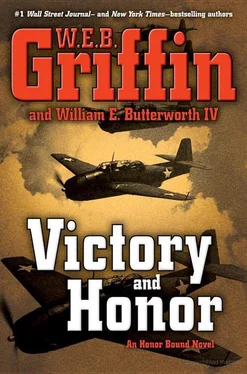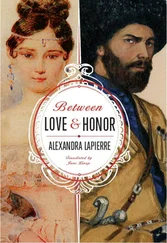Their route took them past the German Embassy on Avenida Córdoba, causing Clete to wonder if Martín had done so intentionally. There were two soldiers standing in front of the gate. They were wearing German-style steel helmets and German-style gray uniforms and were holding German 7mm Mauser rifles in what the Marine Corps would call the Parade Rest position.
But they were not Germans. They were Argentines. And flying from atop the pole just inside the fence was the blue and white flag of Argentina, not the red swastika-centered flag of Nazi Germany that had flown there for so long.
Clete wondered what Boltitz and von Wachtstein were thinking about that.
4730 Avenida Libertador General San Martín Buenos Aires 1405 11 May 1945
When the parade of vehicles from the airport reached Uncle Guillermo’s turn-of-the-century mansion, Cletus saw proof that it had been no accident that everybody had come there for a talk over lunch. Dorotea indeed had set it up—and made sure they were expected.
The first suggestion of that was the 1940 Ford station wagon parked at the curb. A legend painted on its doors read FRIGORÍFICO MORÓN. That, Frade thought, could be considered disinformation— maybe even a cover —as the Frigorífico Morón—or Morón Slaughterhouse and Feeding Pens—no longer existed to process the cattle from his estancia. The property in Morón was now the site of Aeropuerto Coronel Jorge G. Frade.
Two men were sitting in the Ford. Clete knew that they were armed with Remington Model 11 twelve-gauge riot shotguns, .45 ACP Thompson submachine guns, and Argentine versions of the U.S. 1911-A1 .45 ACP pistol. He was certain, too, that on the street behind the mansion there could be found another vehicle, maybe not another station wagon, but one also carrying the FRIGORÍFICO MORÓN legend on its doors, and also holding at least two well-armed men.
The armed men were all ex–troopers of the Húsares de Pueyrredón. And they had been born—as had their parents and their parents’ parents, as far back as anyone could remember—on Estancia San Pedro y San Pablo.
Clete’s father had versed him well in their distinguished history, to which he now was deeply connected.
Back in 1806, Estancia San Pedro y San Pablo had been owned by Juan Martín de Pueyrredón. When the British occupied Buenos Aires, he escaped to the estancia, which encompassed some eighty-four thousand hectares, or a little more than three hundred twenty-five square miles. He turned several hundred of its gauchos— his gauchos—into a cavalry force, and returned to Buenos Aires and recaptured the city. Not overwhelmed with modesty, Pueyrredón named his force of ferocious cowboys the Húsares de Pueyrredón. The title was made official in 1810, and the regiment was the most senior unit of the Argentine army.
From the beginning, gauchos of Estancia San Pedro y San Pablo had done their military service with the Húsares and then returned to the estancia, either after completion of their required national service or on their retirement.
As the estancia, under the Napoleonic Code, passed from one descendant of Juan Martín de Pueyrredón to another, many of the patrónes of Estancia San Pedro y San Pablo—after starting their careers fresh from the military academy as subtenientes —in time became colonels commanding the Húsares de Pueyrredón. Two of the most recent colonels commanding, el Coronel Jorge G. Frade and his father, el Coronel Guillermo Alejandro Frade, had done so.
El Coronel Jorge G. Frade would have preferred that his only son, Cletus, follow in the footsteps of his ancestors. But he’d taken what solace he could from knowing that Cletus had served with great distinction in the United States Corps of Marines, which el Coronel Frade had considered to be a military organization very nearly as prestigious as the Húsares de Pueyrredón.
On el Coronel Frade’s assassination, the gauchos of Estancia San Pedro y San Pablo—the ex–troopers of the Húsares de Pueyrredón—had no trouble at all passing their loyalty to the new patrón .
First Lieutenant Cletus H. Frade, USMCR, had been more than a little discomfited to be crisply saluted by the estancia’s gauchos. More recently, he had been even more discomfited when Enrico Rodríguez spread the news all over the estancia of Clete’s promotion to lieutenant colonel—and the ex-troopers began addressing him as “mi coronel . ”
But he had grown used to it, and had come to think, perhaps immodestly, of the gauchos/ex–Húsares de Pueyrredón troopers as his private army. They were deployed all over Argentina, protecting the vast properties that he’d inherited after his father’s murder. As here at Uncle Willy’s house, they stood guard over Clete’s immediate and extended families, as well as at the various places where he had, as he thought of it, stashed people who needed either protection or confinement.
Frade thought of all this when the massive iron gate to the mansion was opened to them by a tough-looking man cradling a Thompson in his arms and then when they had driven into the underground garage and another heavily armed man had opened the Horch’s door, smiled, and said, “Doña Dorotea,” and then come to attention and said, “Mi coronel . ”
Everyone exited their vehicles and followed Dorotea into the house itself. They were greeted by a small army of servants standing behind a distinguished-looking elderly man wearing a nicely tailored butler’s suit and tie. Antonio Lavalle had been Jorge Frade’s butler. Now he was head of Dorotea’s crews running everything for her everywhere.
Dorotea turned to the newly arrived group of men and announced, “For those of you gentlemen who have not met our butler, this is Antonio Lavalle. He and his staff will assist those of you who would like to perhaps freshen up. Or who would simply prefer to relax. Please make yourself at home.”
She then turned to Antonio Lavalle and said loud enough for everyone to hear, “And you may please start serving any of our guests in the library.”
As Clete walked with his bride up the staircase to the mansion’s master bedroom that took up most of the third floor, he thought—as he often did—that he had many memories of Uncle Guillermo’s house, many of them very private and very touching—and too many of them of vicious murder.
Clete’s father had been born here, and had insisted on turning over the mansion to him the first day that father and son had, over many drinks and emotional moments, reconnected.
Not long after, Clete had been in the master bedroom when la Señora Marianna Rodríguez de Pellano—Enrico’s sister, who had cared for Clete from birth until his mother had gone to the States and died in childbirth—had had her throat cut in the kitchen. Assassins had killed her in order to get to Clete. But, when they’d come upstairs after him, he had shot them both dead with an Argentine .45—wounding one first in the leg before putting a round in his forehead.
Three days later, as Clete lay in the bed, an angry la Señorita Dorotea Mallín burst in and gave him hell for not calling her after the attack. What happened next caused Clete’s first son to be conceived—and for Clete to no longer be able to lovingly refer to Dorotea as “the Virgin Princess.”
And, late one December night, it had been in Uncle Willy’s house that Clete had first come across a young man in the library. The stranger, slumped in one of the armchairs, had worn a quilted, darkred dressing gown. There’d been a cognac snifter resting on his chest, a lit cigar in the ashtray on the table beside him, and Beethoven’s Third Symphony coming from the phonograph.
Читать дальше












